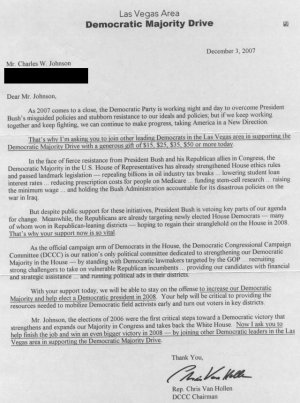Reformist overtures
Saturday I got a letter from the Las Vegas Area Democratic Majority Drive,
an attempt by the Democratic Congressional leadership–which already has a majority but has been doing nothing or worse with it–to drum up money for an even bigger do-nothing majority through the Democratic Congressional Campaign Committee. Here’s the letter I got:

Dear Mr. Johnson,
As 2007 comes to a close, the Democratic Party is working night and day to overcome President Bush’s misguided policies and stubborn resistance to our ideals and policies, but if we keep working together and keep fighting, we can continue to make progress, taking America in a New Direction.
That’s why I’m asking you to join other leading Democrats in the Las Vegas area in supporting the Democratic Majority Drive with a generous gift of $15, $25, $35, $50 or more today.
In the face of fierce resistance from President Bush and his Republican allies in Congress, the Democratic Majority in the U.S. House of Representatives has already strengthened House ethics rules and passed landmark legislation–repealing billions in oil industry tax breaks … lowering student loan interest rates … reducing prescription costs for people on Medicare … funding stem-cell research … raising the minimum wage … and holding the Bush Administration accountable for its disastrous policies on the war in Iraq.
But despite public support for these initiatives, President Bush is vetoing key parts of our agenda for change. Meanwhile, the Republicans are already targeting newly elected House Democrats — many of whom won in Republican-leaning districts — hoping to regain their stranglehold on the House in 2008. That’s why your support now is so vital.
As the official campaign arm of Democrats in the House, the Democratic Congressional Campaign Committee (DCCC) is our nation’s only political committee dedicated to strengthening our Democratic Majority in the House–by standing with Democratic lawmakers targeted by the GOP … recruiting strong challengers to take on vulnerable Republican incumbents … providing our candidates with financial and strategic assistance … and running political ads in their districts.
With your support today, we will be able to stay on the offense to increase our Democratic Majority and help elect a Democratic president in 2008. Your help will be critical to providing the resources needed to mobilize Democratic field activists early and turn out voters in key districts.
Mr. Johnson, the elections of 2006 were the first critical steps toward a Democratic victory that strengthens and expands our Majority in Congress and takes back the White House. Now I ask you to help finish the job and win an even bigger victory in 2008–by joining other Democratic leaders in the Las Vegas area in supporting the Democratic Majority Drive.
Thank You,
Rep Chris Van Hollen
DCCC Chairman
I marked the enclosed contribution form $0.00 and referred them to this enclosed letter, which I mailed them today, postage courteously paid by the D.C.C.C.
Rep. Chris Van Hollen
Chair, Democratic Congressional Campaign Committee
P.O. Box 96039
Washington, DC 20077-7243Dear Rep. Van Hollen:
Yesterday I received a direct mail solicitation from you as part of the
Las Vegas Area Democratic Majority Drive,asking me to donate money to the D.C.C.C. I am writing to inform you that, under the present conditions, I cannot donate in good conscience, and I have joined a Democratic Donor Strike against both the D.C.C.C. and the D.S.C.C. (http://www.democrats.com/donor-strike-2007).While I have contributed both votes and campaign donations to Democratic candidates in the past, I have been deeply disappointed by the refusal of Democratic leadership and the Democratic-controlled Congress to live up to the promises that brought them into the majority in the 2006 elections. In your fund-raising letter, you write that
the Democratic Party is working night and day to overcome President Bush’s misguided policies,and claim that the Congressional Democrats have already beenholding the Bush Administration accountable for its disastrous policies on the war in Iraq.But under the control of Democrat Nancy Pelosi in the House of Representatives and Democrat Harry Reid in the Senate, the Democratic Congressional leadership has repeatedly shown, by its actions, that either it agrees with the Bush administration’s misguided policies, or else will do nothing to check them. For example, every penny of funding for the catastrophic war on Iraq must be approved by the Democratic Congress, and if you refuse to continue funding the war, President Bush has no power to continue it. Yet the catastrophic war in Iraq rages on because Congressional Democrats have supported Bush’s demands for unconditional and unlimitedemergencyfunding to continue this appalling war over and over again. They have faced nofierce resistance from President Bush and his Republican allies in Congress,because they continue to capitulate to every demand of Bush and the Republican war hawks. That is not even a failure; it is complicity.In light of the Democratic leadership’s actions, I will not support, or donate money to, either the D.C.C.C. or the D.S.C.C., under any conditions, unless and until the Democratic-controlled Congress stands up to the Bush administration and accomplishes these four goals:
Restricting any new Iraq funds to a safe and immediate withdrawal of U.S. troops—not another penny for occupation or the Bush-Maliki
enduring security guarantees;Passing legislation explicitly prohibiting any use of funds to plan or execute a pre-emptive attack on Iran, and repealing the post-9/11 Authorization of Use of Military Force that Bush and Cheney believe authorizes them to attack Iran or any other country they please, as well as to wiretap all our calls and emails without warrants;
Fully restoring key civil liberties by strictly outlawing warrantless wiretapping and torture, closing Guantanamo, and restoring habeas corpus;
Completing the investigation of White House crimes by using
inherent contemptto compel testimony by current and former White House officialsIf
my help will be critical,as you claim in your letter, then I urge you and your fellow Democrats in Congress to make that help possible by demonstrating your commitment to these four goals. And I mean demonstrating your commitment by deeds, not by words. You can begin immediately by refusing to allow Congressional Republicans to attach tens billions of dollars in unconditional funding for the war on Iraq to the 2008 defense budget. I urge you to do so.Sincerely, etc.
No union with war-mongers, spiritually or politically.
And I heard another voice from heaven, saying, Come out of [Babylon], my people, that ye not be partakers of her sins, and that ye receive not of her plagues.
